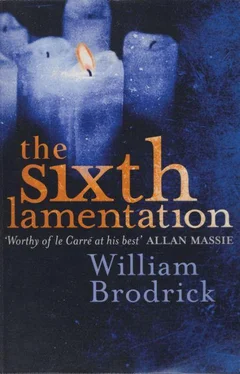William Brodrick - The Sixth Lamentation
Здесь есть возможность читать онлайн «William Brodrick - The Sixth Lamentation» весь текст электронной книги совершенно бесплатно (целиком полную версию без сокращений). В некоторых случаях можно слушать аудио, скачать через торрент в формате fb2 и присутствует краткое содержание. Жанр: Триллер, на английском языке. Описание произведения, (предисловие) а так же отзывы посетителей доступны на портале библиотеки ЛибКат.
- Название:The Sixth Lamentation
- Автор:
- Жанр:
- Год:неизвестен
- ISBN:нет данных
- Рейтинг книги:5 / 5. Голосов: 1
-
Избранное:Добавить в избранное
- Отзывы:
-
Ваша оценка:
- 100
- 1
- 2
- 3
- 4
- 5
The Sixth Lamentation: краткое содержание, описание и аннотация
Предлагаем к чтению аннотацию, описание, краткое содержание или предисловие (зависит от того, что написал сам автор книги «The Sixth Lamentation»). Если вы не нашли необходимую информацию о книге — напишите в комментариях, мы постараемся отыскать её.
The Sixth Lamentation — читать онлайн бесплатно полную книгу (весь текст) целиком
Ниже представлен текст книги, разбитый по страницам. Система сохранения места последней прочитанной страницы, позволяет с удобством читать онлайн бесплатно книгу «The Sixth Lamentation», без необходимости каждый раз заново искать на чём Вы остановились. Поставьте закладку, и сможете в любой момент перейти на страницу, на которой закончили чтение.
Интервал:
Закладка:
‘For a meal.’
‘Where?’
‘In a crypt.’
‘Sounds like my sort. How did you meet him?’
‘I’m too tired to explain,’ Lucy said, laughing for the first time that day
‘I’ll sweat it out of you. Give me a call.’
They said goodnight and Lucy put the phone down with a sigh. As with all misunderstandings, Cathy was on to something. Since meeting Pascal Lucy wasn’t quite her old self, and she didn’t fully recognise who she was becoming.
Chapter Nineteen
1
‘Apollo adored the Sibyl so he offered her anything she wished,’ said Pascal, turning a beer mat round in circles. A gathering of other conversations drifted from the debating room out to where they sat on the veranda. Putney Bridge lay black against a scattering of white and orange evening lights.
‘And?’ said Lucy
‘She asked to live for as many years as she had grains of sand in her hand. He granted her wish but she refused to satisfy his passion.’
‘Sounds like a good deal to me.’
‘Not entirely’
‘Why?’
‘She forgot to ask for health and youth.’
‘Ah.’
‘So she grew old and hideous and lived for hundreds of years.
‘Doing what?’
‘Her old job, writing riddles on leaves, left at the mouth of her cave.’ He sipped his drink. ‘That’s the part of the myth I like, the fragility of what she had to say; words written on leaves, easily made incomprehensible if disturbed by a careless wind.’
Lucy could only think of Agnes, the sand all but gone. She said, ‘I understand her, though, wanting to live so much.’
‘Yes, but life pushed on is always death pulled back. It comes. In a way there’s something dismal about wanting to postpone what you can’t avoid.’
‘But it can come too soon.
‘That’s what the Sibyl thought.’
Lucy admired his lack of complication — but with nostalgia: her own simplicity had been mislaid. She had seen death at work, its industrious regard for detail, and, like the men who dug up the roads, its preference for doing the job slowly
‘I think you’d get on with my grandmother,’ she said.
They had met at Pascal’s suggestion. He gave no reason; he just asked. So they sat down with no purpose other than a shared inclination to know one another better. Leaving the Sibyl behind, Lucy raised the key question:
‘What do your family think of you dropping journalism for all this?’
‘Not pleased at all.’
‘Do you mind if I ask why?’ She had the sparkling enthusiasm of a specialist.
Settling back, like a long-distance driver who knows the road, Pascal said, ‘It’s all about guilt, really’ — he flipped the beer mat — ‘even though none of us were around at the time. To put it bluntly, the whole family ran off to the south, leaving my great-uncle Jacques behind in Paris. Okay it was his choice, but it’s an unpleasant fact. If they’d stayed with him, maybe they could have done something after he was arrested.’ He sipped his beer, thinking. ‘That’s probably not true, but it’s one of those peculiar notions. Once thought, it won’t go away They settled on the Swiss border and Jacques was deported to Mauthausen. They survived. He didn’t. The lack of symmetry says it all. After the war they made sure Jacques was remembered. It was all they could do. Schwermann and the rest had vanished. So I grew up with a complex memory of remorse, pride and what you might call unfinished business.’
But, as Pascal explained, the family memory had become complicated by the political career of his father, Etienne, and the complex mood in France during the 1960s. Myths assembled after the war to smooth out the realities of Occupation — the mix of resistance and cooperation — had come under attack. Heroes were denounced, villains rehabilitated. And it was within this public struggle that Pascal’s father had deftly trodden the political stage. He’d had considerable ambition and a considerable problem: his father, Claude, had been a supporter of Vichy and he couldn’t refer to Jacques’ exploits without placing a spotlight on collaboration and plunging his name into the maelstrom of conflicting views about the past. So while Pascal had grown up with a memory of stolen retribution, the official family line on war crimes had become one of merciful forgetfulness. Let the past bury itself. Thus, when Paul Touvier was arrested in the late eighties, Etienne had been for understanding the moral complexity of the time, but the high-minded Pascal, then seventeen, had advocated judicial retribution. After all, he’d been a French servant of the Reich. That row had caused no lasting harm. For his parents it had been just one of the more extensive entries in the Register of Differences filled out by Pascal as he defined himself against them, made colourful by adolescence and by that fact destined to fade back into unanimity once he’d grown up and seen things as he should.
Pascal did grow up, and things did fade, but, as always happens, far less than his parents expected. He became a political journalist with a side-interest in Vichy, producing one or two scoops about notorious figures who had lived comfortable lives in post-war France undisturbed by their past. This was closer to the family bone, and, looking back, it was only a matter of time before Pascal’s research touched upon Jacques’ life and, by default, upon his father’s understanding of his prospects. It was Pascal’s career, however, that flourished. Appointed as the Washington correspondent for Le Monde, he moved to the United States, and that was when the door to his present life opened. By chance he found the memo referring to Schwermann and Brionne. He said, ‘After reading that I knew there was a good chance of finding them. It was a moment of crisis, believe me.
That moment took Pascal home to a bright Paris morning, the sort that could generate a song. His mother was happily moving in and out of the salon, relieved to have her boy at home again; father and son were enjoying the bashful pleasure of shared manhood come too soon. Pascal spoke, knowing the coming cost, the loss of amity: ‘I want to find him.’
Etienne put down Le Monde, read with a new enthusiasm since his son’s elevation, and stubbed out a cigar. Monique came in, buoyantly suggesting a walk in the park. She withdrew, uneasily, at a signal from her husband.
‘You can’t,’ he said.
That command had a peculiar effect on Pascal, pushing him down the road. ‘I can.’
‘You mustn’t.’
‘What about must?’
Another silence.
‘Pascal, France has suffered enough.’
‘That’s not the test.’
More silence, with a chasm opening wide. Pascal’s father reached over, with both hands: ‘I beg you,’ he said with barely suppressed panic, ‘look at things with older eyes, just for a moment, with the wounds of those who endured the Occupation. Why do you think de Gaulle, of all people, reprieved the death sentence on Vasseur and Klaus Barbie in the sixties? Why do you think d’Estaing honoured Petain at Douaumont in the seventies? Why did Mitterrand shake Kohl’s hand at Verdun in the eighties? Because sometimes we cannot make a synthesis of the past, and there comes a time when we have to forgive what we can, when it is better to forget what cannot be forgiven. Your generation is obsessed with the failures of your forefathers. Let them judge themselves. You wouldn’t have done any better.’
‘I’m sure I wouldn’t, but that’s why an obligation rests on the next generation — to expose the past for what it was. This is not just about Jacques. It’s about history. Getting it right. The same year Barbie was convicted, Le Pen said the gas chambers were a minor detail of the war. There’s a kind of forgetting we have to stop.’
Читать дальшеИнтервал:
Закладка:
Похожие книги на «The Sixth Lamentation»
Представляем Вашему вниманию похожие книги на «The Sixth Lamentation» списком для выбора. Мы отобрали схожую по названию и смыслу литературу в надежде предоставить читателям больше вариантов отыскать новые, интересные, ещё непрочитанные произведения.
Обсуждение, отзывы о книге «The Sixth Lamentation» и просто собственные мнения читателей. Оставьте ваши комментарии, напишите, что Вы думаете о произведении, его смысле или главных героях. Укажите что конкретно понравилось, а что нет, и почему Вы так считаете.












